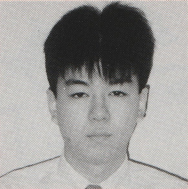Difference between revisions of "Kota Matsumoto"
From Sega Retro
| (2 intermediate revisions by the same user not shown) | |||
| Line 1: | Line 1: | ||
{{PersonBob | {{PersonBob | ||
| − | | image= | + | | image=KotaMatsumoto Harmony1994.jpg |
| birthplace= | | birthplace= | ||
| dob= | | dob= | ||
| dod= | | dod= | ||
| employment={{Employment | | employment={{Employment | ||
| − | | company=[[Sega | + | | company=[[Sega Enterprises, Ltd.|Sega Enterprises]] |
| − | | divisions=[[Sega | + | | divisions=[[Sega AM2]], [[Sega AM11]] |
| + | | start=1994-04-01{{magref|harmony|127|12}} | ||
| + | }} | ||
| + | {{Employment | ||
| + | | company=[[Amusement Vision]] | ||
| + | }} | ||
| + | {{Employment | ||
| + | | company=[[Sega Corporation (2000-2015)|Sega]] | ||
| + | | divisions=[[Sega AM2 (2004-2011)|Sega AM2]], [[Sega R&D2 (2011-2015)|Sega R&D2]] | ||
| + | }} | ||
| + | {{Employment | ||
| + | | company=[[Sega Interactive (Japan)|Sega Interactive]] | ||
| + | | divisions= | ||
| + | }} | ||
| + | {{Employment | ||
| + | | company=[[Sega Corporation (2000-2015)|Sega]] | ||
| + | | divisions=第3事業部{{ref|https://web.archive.org/web/20230601004656/https://cedec.cesa.or.jp/2023/session/detail/s64115b421c17c}} | ||
}} | }} | ||
| role=Programmer | | role=Programmer | ||
| − | | education= | + | | education=[[wikipedia:Nagoya Institute of Technology|Nagoya Institute of Technology]]{{magref|harmony|127|12}} |
}} | }} | ||
| − | {{sub-stub}}'''{{PAGENAME}}'''. | + | {{sub-stub}}'''{{PAGENAME}}''' (松本 浩太) is a programmer at [[Sega of Japan]]. After graduating from university in 1994{{ref|https://web.archive.org/web/20230601004656/https://cedec.cesa.or.jp/2023/session/detail/s64115b421c17c}} he joined Sega and was assigned to [[Sega AM2|AM R&D Dept.#2]] where he worked on the ''[[:category:Virtua Fighter (franchise)|Virtua Fighter]]'' series, followed by programming the character animation engine for the ''[[:category:Spikeout|Spikeout]]'' franchise at [[Sega AM11|AM11]]/[[Amusement Vision]]. He eventually moved back to [[Sega AM2 (2004-2011)|AM2]] to once again work on ''Virtua FIghter'', and became heavily involved with the ''[[:category:Hatsune Miku|Hatsune Miku: Project Diva]]'' games and produced videos for live concerts such as Miku no Hi Kanshasai 39's Giving Day. More recently he has been involved with developing ''[[Fate/Grand Order Arcade]]'' at Division 3{{ref|https://web.archive.org/web/20230601004656/https://cedec.cesa.or.jp/2023/session/detail/s64115b421c17c}}. |
==Production history== | ==Production history== | ||
| − | {{ProductionHistory| | + | {{ProductionHistory|{{PAGENAME}}|松本 浩太}} |
==References== | ==References== | ||
<references /> | <references /> | ||
Latest revision as of 07:45, 20 February 2024

|
| Kota Matsumoto |
|---|
| Employment history: Sega Enterprises (1994-04-01[1] – )
Divisions:
Divisions:
Divisions:
第3事業部
|
| Role(s): Programmer |
| Education: Nagoya Institute of Technology[1] |
This teeny-tiny article needs some work. You can help us by expanding it.
Kota Matsumoto (松本 浩太) is a programmer at Sega of Japan. After graduating from university in 1994[2] he joined Sega and was assigned to AM R&D Dept.#2 where he worked on the Virtua Fighter series, followed by programming the character animation engine for the Spikeout franchise at AM11/Amusement Vision. He eventually moved back to AM2 to once again work on Virtua FIghter, and became heavily involved with the Hatsune Miku: Project Diva games and produced videos for live concerts such as Miku no Hi Kanshasai 39's Giving Day. More recently he has been involved with developing Fate/Grand Order Arcade at Division 3[2].
Production history
Games
- (; 1994) — AI & Rank mode
- (; 1996) — Game System, CPU Battle
- (; 1997) — Game System, CPU Battle
- (; 1998) — Game Control & Motion System Programmer
- (; 1998) — Game Regulation
- (; 1998) — Game System, CPU Battle
- (; 1999) — Game Control & Motion System Programmer
- (; 1999) — Game Regulation
- (; 2000) — Programmers
- (; 2001) — Game Designer
- (; 2001) — Program Director
- (; 2001) — Director
- (; 2001) — System Programmers
- (; 2002) — System Programmers
- (; 2004) — AI & Rank mode
- (; 2005) — Supervisor
- (; 2005) — System Programmers
- (; 2005) — Programmers
- (; 2008) — Program Leader
- (; 2010) — Program Leader
- (; 2012) — Program Leader
- (; 2012) — Program Leader
- (; 2013) — Programmers
- (; 2016) — Programmers
Videos
- (; 1995) — AI&R ank mode
- (; 1995) — AI&R ank mode
References
- ↑ 1.0 1.1 Harmony, "1994 4" (JP; 1994-04-01), page 12
- ↑ 2.0 2.1 2.2 https://cedec.cesa.or.jp/2023/session/detail/s64115b421c17c (Wayback Machine: 2023-06-01 00:46)